

Your Smartphone Can Reduce Your Brainpower, Even If It's Just Sitting There. Metaphors grow the mind and feed the soul. Don’t lose them. This April, Forbes magazine published the article ‘The Writer Who Couldn’t Answer Standardized Test Questions About Her Own Work (Again)!’

- The Washington Post. No, Your Kids' Evil Cellphone Won't Give Them Horns. How Playing Music Benefits Your Brain More than Any Other Activity. “Each note rubs the others just right, and the instrument shivers with delight.
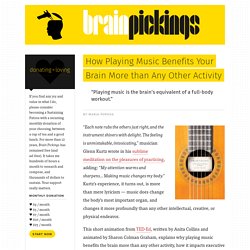
The feeling is unmistakable, intoxicating,” musician Glenn Kurtz wrote in his sublime meditation on the pleasures of practicing, adding: “My attention warms and sharpens… Making music changes my body.” Kurtz’s experience, it turns out, is more than mere lyricism — music does change the body’s most important organ, and changes it more profoundly than any other intellectual, creative, or physical endeavor. This short animation from TED-Ed, written by Anita Collins and animated by Sharon Colman Graham, explains why playing music benefits the brain more than any other activity, how it impacts executive function and memory, and what it reveals about the role of the same neural structure implicated in explaining Leonardo da Vinci’s genius.
Why Teens Should Understand Their Own Brains (And Why Their Teachers Should, Too!) Blakemore has a new book, Inventing Ourselves, The Secret Life of the Teenage Brain — where she dives into the research and the science — and offers insights into how young adults are thinking, problem-solving and learning. Our conversation has been edited for length and clarity. Interview Highlights Understanding the teenage brain can be really useful in an educational context. What are some things you've learned that educators should know? Sleep. Kierkegaard on Why Anxiety Powers Creativity Rather Than Hindering It. “Anxiety is love’s greatest killer,” Anaïs Nin famously wrote. But what, exactly, is anxiety, that pervasive affliction the nature of which remains as drowning yet as elusive as the substance of a shadow? In his 1844 treatise The Concept of Anxiety (public library), Danish philosopher Søren Kierkegaard (May 5, 1813–November 11, 1855) explains anxiety as the dizzying effect of freedom, of paralyzing possibility, of the boundlessness of one’s own existence — a kind of existential paradox of choice.
Increased Hours Online Correlate With Uptick In Teen Depression, Suicidal Thoughts. How Language Shapes the Brain. Source: Credit: Lizzie Roberts Getty Images Co-authored with Sayuri Hayakawa, Ph.D.
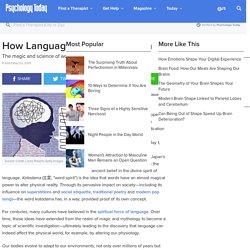
As Japan's Emperor Akihito stepped down from the Chrysanthemum Throne in the country's first abdication in 200 years, Naruhito officially became the new Emperor on May 1, 2019, ushering in a new era called Reiwa (令和; “harmony”). Japan’s tradition of naming eras reflects the ancient belief in the divine spirit of language. Kotodama (言霊; “word spirit”) is the idea that words have an almost magical power to alter physical reality. Through its pervasive impact on society—including its influence on superstitions and social etiquette, traditional poetry and modern pop songs—the word kotodama has, in a way, provided proof of its own concept. article continues after advertisement.
Music: The part of your brain that will never get lost to Alzheimers. Some music inspires you to move your feet, some inspires you to get out there and change the world.
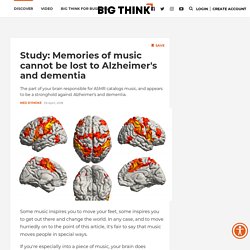
In any case, and to move hurriedly on to the point of this article, it's fair to say that music moves people in special ways. If you're especially into a piece of music, your brain does something called Autonomous Sensory Meridian Response (ASMR), which feels to you like a tingling in your brain or scalp. It's nature's own little "buzz", a natural reward, that is described by some as a "head orgasm". Let Children Get Bored Again. New Research Shows That Petting Dogs Is Like A Drug For Our Brains. 500 Internal Server Error. The brain may be able to repair itself. From human brain analyses and studies in model organisms such as rodents and birds, we know neurogenesis in the adult brain persists throughout the life of the organism and is essential for maintaining both brain structure and function.
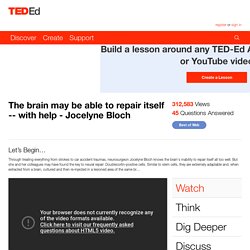
This article from The Guardian provides an excellent overview of the history of Neurogenesis research. Watch these recommended TED-Ed Lessons and TED Talks: Could your brain repair itself? Imagine the brain could reboot, updating its damaged cells with new, improved units. That may sound like science fiction — but it’s a potential reality scientists are investigating right now.
Why Students Forget—and What You Can Do About It. Teachers have long known that rote memorization can lead to a superficial grasp of material that is quickly forgotten. Educators' Packages. The Educators’ Package for Series 1 contains a set of six articles designed to complement and supplement the six programs (programs 2-7) in Video Series 1 ("Understanding Traumatized Children").
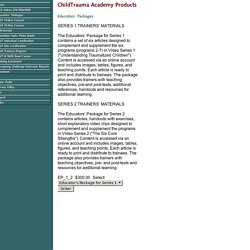
Content is accessed via an online account and includes images, tables, figures, and teaching points. Each article is ready to print and distribute to trainees. The package also provides trainers with teaching objectives, pre-and post-tests, additional references, handouts and resources for additional learning. The Educators’ Package for Series 2 contains articles, handouts with exercises, short explanatory video clips designed to complement and supplement the programs in Video Series 2 (“The Six Core Strengths”). What Do You See: Visual Thinking Strategies in Action – Copy / Paste by Peter Pappas. I’m pleased to be offering a pair of workshops in Eugene Ore this month on how to enhance instruction using visual thinking strategies.
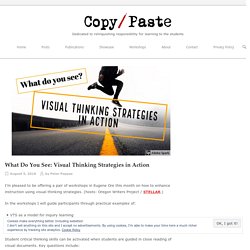
(hosts: Oregon Writers Project / STELLAR.) In the workshops I will guide participants through practical examples of: VTS as a model for inquiry learningTeaching inquiry with documentsBlending visual & critical thinking with literacy Student critical thinking skills can be activated when students are guided in close reading of visual documents. Key questions include: What does it (image) say? Teaching Visual Literacy to Students. Science Explains What Happens to Someone’s Brain From Complaining Every Day. Why 'getting lost in a book' is so good for you, according to science. Get the Better newsletter. July 22, 2018 / 2:20 PM GMT / Updated July 22, 2018 / 2:20 PM GMT. 5 Strategies to Demystify the Learning Process for Struggling Students. Oakley recognizes that “many educators are not at all comfortable with or trained in neuroscience,” so she breaks down a few key principles that teachers can use in the classroom and share with students to help them demystify the learning process. 1.
The Hiker Brain vs. The Race Car Brain Start by teaching students the difference between focused and diffused thinking, says Oakley. 10 Ways to Improve Metacognition in Students. Declining Student Resilience: A Serious Problem for Colleges. A year ago I received an invitation from the head of Counseling Services at a major university to join faculty and administrators for discussions about how to deal with the decline in resilience among students.
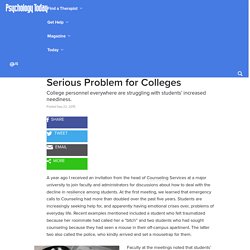
At the first meeting, we learned that emergency calls to Counseling had more than doubled over the past five years. Students are increasingly seeking help for, and apparently having emotional crises over, problems of everyday life. Children, Learning, and the Evaluative Gaze of School — Carol Black. Harnessing the Incredible Learning Potential of the Adolescent Brain. How Bibliotherapy Can Help Students Open Up About Their Mental Health. For adolescents struggling with depression, anxiety and grief, the use of books as a therapeutic tool can be invaluable. The Psychology of What Makes a Great Story. It could save your sanity. Metacognition and self-regulated learning. Beyond Grit: The Science of Creativity, Purpose, and Motivation.
Why Identity and Emotion are Central To Motivating the Teen Brain. The Mind's Eye Strategy. Having Your Smartphone Nearby Takes a Toll on Your Thinking (Even When It’s Silent and Facedown) Kristen Duke is a PhD candidate in Marketing at the Rady School of Management, University of California, San Diego. She studies how uncertainty, emotional complexity, and contextual factors affect decision-making and consumer experiences. Adrian Ward is an Assistant Professor of Marketing in the McCombs School of Business, University of Texas at Austin. What Are the Brain Benefits of Unplugging for Students and Teachers? Our kids are spending eight hours on electronics every single day.
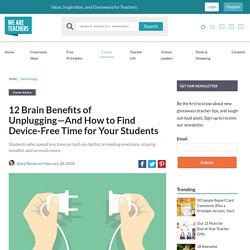
The world UNPLUGGED. Edutopia. I lost my first student to suicide not long ago. Edutopia. Teaching students basic knowledge about the brain’s potential can have a positive impact on their motivation, grit, and achievement. Edutopia. Trauma Training Toolkit 8 29 2016. Trauma Training for Educators – Communities In Schools Of Central Texas. Click the red “PLAY” icon below to view the training video.
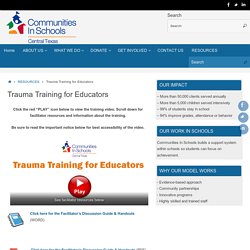
Why Students Forget—and What You Can Do About It. VT Routines Intro Packet 2016. Ww2.kqed. Visible Thinking. Speak With Love: How Your Words Literally Restructure Your Brain. Six-Month-Old Babies Have Connected Vocabularies. When The Focus Is On The Student, Not The Class : NPR Ed. Reading Strategies That Work, According To Science - WeAreTeachers. Ww2.kqed. Here's How You Can Use Meditation To Change Your Brain. Infographic: The Impact of Poverty on the Brain - WeAreTeachers. Edutopia. Brains in Pain Cannot Learn! 5 Brain-Based Vocabulary Activities for the Secondary Classroom. Retrieval Practice: The Most Powerful Learning Strategy You're Not Using.
Bigthink. Harnessing the Incredible Learning Potential of the Adolescent Brain. Reading Response Bookmarks.pdf. 52G3LTP08OVNI3G9NMI8. Ask Moving Writers: Information Writing That’s NOT “The Research Paper” Have Smartphones Destroyed a Generation? - The Atlantic. Hands-Off Teaching Cultivates Metacognition.
Shakespeare and Wordsworth boost the brain, new research reveals. Bioethics and the Character of Human Life. SAGE Journals: Your gateway to world-class journal research. Heroic Imagination Research. Learning.blogs.nytimes. New thinking on brain-science therapies could help foster kids – The Denver Post. Using Webb's Depth of Knowledge to Increase Rigor. These are the 13 neuroscience blogs and podcasts you need to follow in 2016. - Your Brain Health.
Musk Is Preparing to Release "Brain Hacking Tech," And He's Not Alone. Deep Sleep and Dreams: How to Wake Up To Your Creativity. A Stanford researcher's 15-minute study hack improves test grades by a third of a grade — Quartz. Bill Gates, Warren Buffett, and Oprah Winfrey All Use the 5-Hour Rule. Your words may predict your future mental health.
To Boost Memory: Study, Wait, Then Exercise - The New York Times. How sugar affects the brain - Nicole Avena. Memories Can Be Inherited, and Scientists May Have Just Figured out How. It’s ‘digital heroin’: How screens turn kids into psychotic junkies. Boston's EMPath Program Uses Science to Fight Family Poverty - The Atlantic. Four neuromyths that are still prevalent in schools – debunked. Rules of memory 'beautifully' rewritten. Speak With Love: How Your Words Literally Restructure Your Brain.
5 Ways Social Media Is Changing Your Brain. Updated brain map identifies 97 new areas. 'Memories' pass between generations. Memories Can Be Inherited, and Scientists May Have Just Figured out How. Research Shows That Brain Training Is Nothing But The Placebo Effect. Are Stories A Key To Human Intelligence? : 13.7: Cosmos And Culture. Science Is Proving Some Memories Are Passed Down From Our Ancestors. How Playing Music Benefits Your Brain More than Any Other Activity. What Kids Should Know About Their Own Brains. Smart Strategies That Help Students Learn How to Learn. Handwriting vs typing: is the pen still mightier than the keyboard? Preventing Youth Suicide Through Lessons Of Hope. New research says video-gaming kids are smarter and more social.
Ex-Stanford dean shares skills everyone should have by 18.